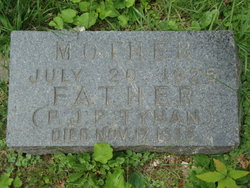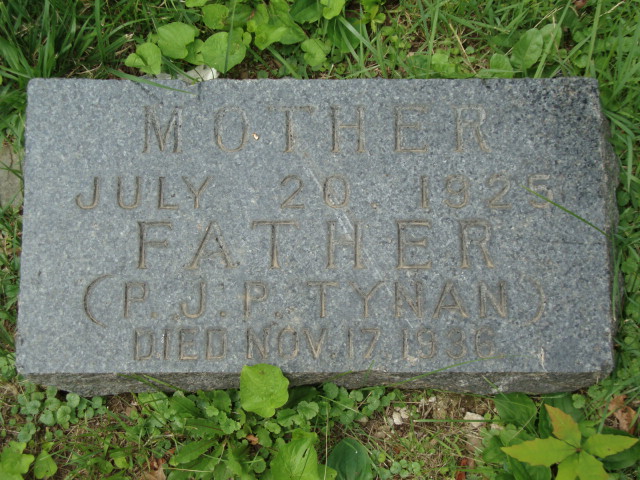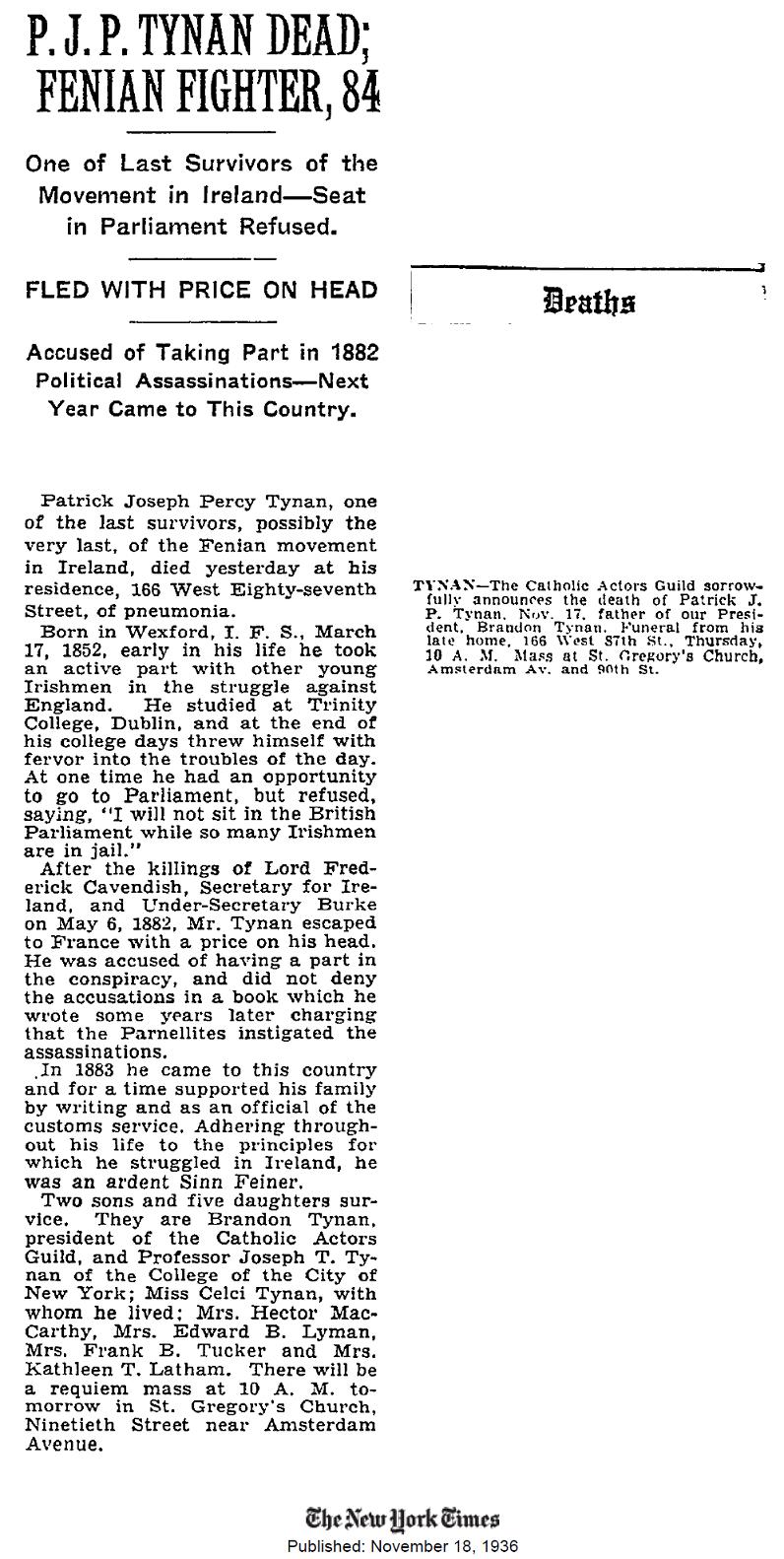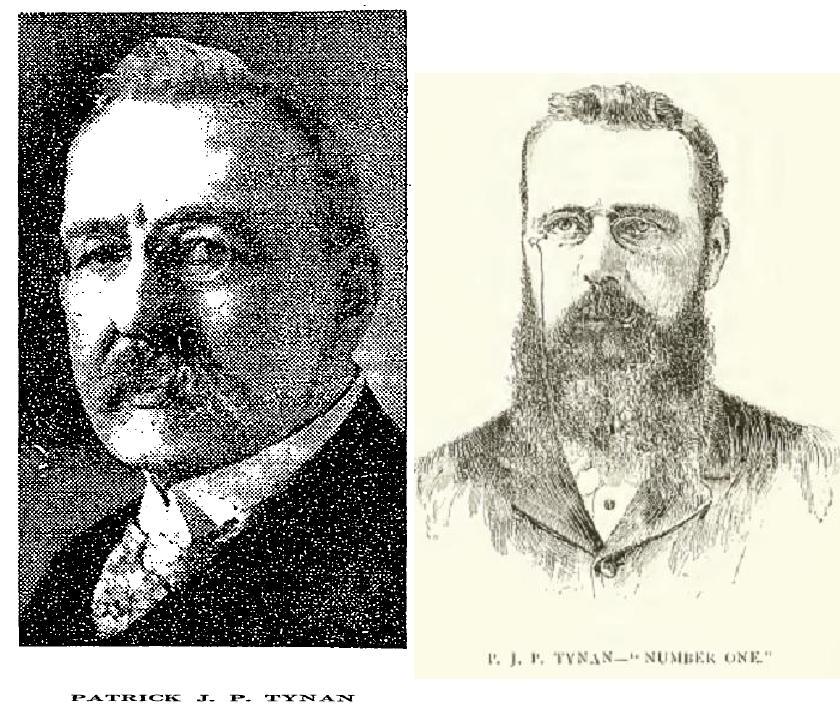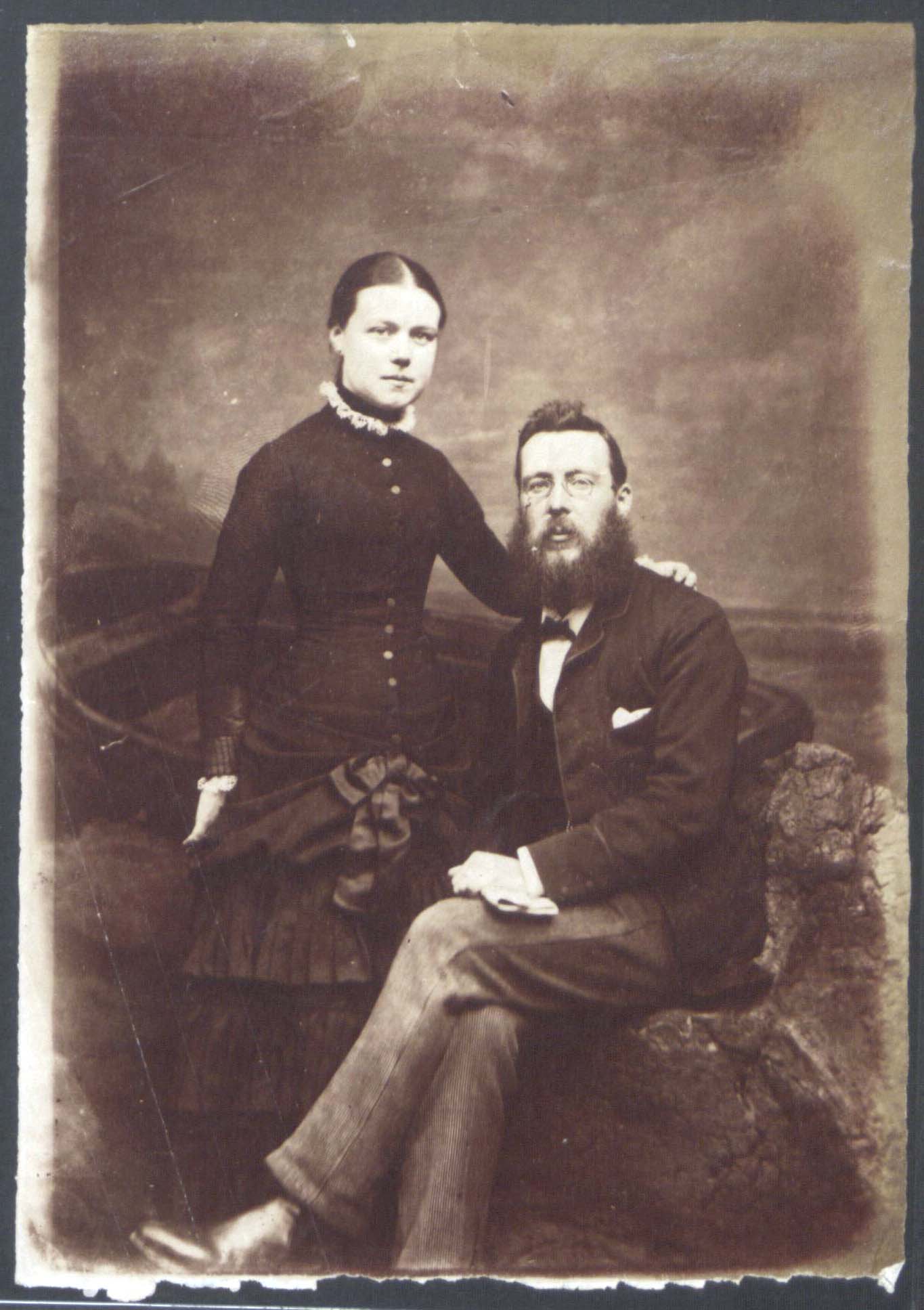As a result of James Carey's testimony, Joe Brady, Michael Fagan, Thomas Caffrey, Dan Curley, and Tim Kelly, were hanged by William Marwood in Kilmainham Jail in Dublin between May 14 and June 4, 1883. Carey was deported to South Africa under an assumed name by the British government. Patrick O'Donnell travelled on the same boat, and shot the informer dead just before he landed at Port Elizabeth, on the 29th day of July 1883. Patrick O'Donnell was arrested and brought back to England for trial. O'Donnell was condemned to death and executed on December 10, 1883. James Carey was buried in the prison graveyard of Port Elizabeth, South Africa. See also the grave of the Invincible James "Skin the Goat" Fitzharris, who is buried in Glasnevin cemetery.
In 1883, Tynan and his family moved to the United States and settled in New York City. However, there were those who doubted that Tynan ever figured prominently in the conspiracy, because his identification as "Number 1" had been founded primarily on his own assertions. Tynan's book "The Irish National Invincibles and Their Times" alleged in 1894 that Parnellites (supporters of Charles Stewart Parnell) had instigated the assasinations. However, his book did not specifically deny his own involvement. Charles Stewart Parnell had made a speech in 1882 condemning the murders. Parnell's speech increased his already huge popularity in both Britain and Ireland. Somewhat ironically, P.J.P. Tynan's son, the actor Brandon Tynan, later played two roles in the movie "Parnell" about Charles Stewart Parnell's life, starring Clark Gable.
Early in his life, P.J.P. Tynan took an active part with other young Irishmen in their struggle against England. His father was a blacksmith who moved his family to Kingstown after Patrick had been born in Wexford, Ireland. Patrick's father opened a shooting gallery and tried to support his family, but he died early. After his father's death, the widow, Patrick's mother, placed Patrick in Trinity College, the school of a religious order near Dublin. She hoped he would become a priest, like his brother, Father James Tynan, R.C.C. Although he developed a fondness for books, P.J.P. Tynan decided when he was about 16 that he had no liking for the priesthood and he left school to go into business. He could speak French, German, and Italian, and he threw himself into the Irish troubles of the day. Young Tynan was apprenticed to a dry good house in Dublin, and after a few years obtained a position with a large wholesale stationery firm in London. He became a traveling salesman in Russia for that firm, and learned to speak Russian. He married Sarah Cassidy, the daughter of a wealthy London tradesman, and went back to Kingston, Ireland, where he opened his own stationary shop. He took a great interest in the Irish politics of the day, and identified himself with the Fenians' Sinn Fein Party. At one time, he had an opportunity to go to Parliament, but refused, saying, "I will not sit in the British Parliament while so many Irishmen are in jail." After moving to America after the Phoenix park murders, P.J.P. Tynan made a living by working for various newspapers. Under President Benjamin Harrison, he was appointed to a United States federal position, but was removed by President Grover Cleveland.
P.J.P. Tynan made international headlines again in 1896 when he was again arrested in France, this time in connection with an alleged plot to use dynamite to blow up Queen Victoria of England and the Czar of Russia. However, those charges were eventually dropped, too.
As a result of James Carey's testimony, Joe Brady, Michael Fagan, Thomas Caffrey, Dan Curley, and Tim Kelly, were hanged by William Marwood in Kilmainham Jail in Dublin between May 14 and June 4, 1883. Carey was deported to South Africa under an assumed name by the British government. Patrick O'Donnell travelled on the same boat, and shot the informer dead just before he landed at Port Elizabeth, on the 29th day of July 1883. Patrick O'Donnell was arrested and brought back to England for trial. O'Donnell was condemned to death and executed on December 10, 1883. James Carey was buried in the prison graveyard of Port Elizabeth, South Africa. See also the grave of the Invincible James "Skin the Goat" Fitzharris, who is buried in Glasnevin cemetery.
In 1883, Tynan and his family moved to the United States and settled in New York City. However, there were those who doubted that Tynan ever figured prominently in the conspiracy, because his identification as "Number 1" had been founded primarily on his own assertions. Tynan's book "The Irish National Invincibles and Their Times" alleged in 1894 that Parnellites (supporters of Charles Stewart Parnell) had instigated the assasinations. However, his book did not specifically deny his own involvement. Charles Stewart Parnell had made a speech in 1882 condemning the murders. Parnell's speech increased his already huge popularity in both Britain and Ireland. Somewhat ironically, P.J.P. Tynan's son, the actor Brandon Tynan, later played two roles in the movie "Parnell" about Charles Stewart Parnell's life, starring Clark Gable.
Early in his life, P.J.P. Tynan took an active part with other young Irishmen in their struggle against England. His father was a blacksmith who moved his family to Kingstown after Patrick had been born in Wexford, Ireland. Patrick's father opened a shooting gallery and tried to support his family, but he died early. After his father's death, the widow, Patrick's mother, placed Patrick in Trinity College, the school of a religious order near Dublin. She hoped he would become a priest, like his brother, Father James Tynan, R.C.C. Although he developed a fondness for books, P.J.P. Tynan decided when he was about 16 that he had no liking for the priesthood and he left school to go into business. He could speak French, German, and Italian, and he threw himself into the Irish troubles of the day. Young Tynan was apprenticed to a dry good house in Dublin, and after a few years obtained a position with a large wholesale stationery firm in London. He became a traveling salesman in Russia for that firm, and learned to speak Russian. He married Sarah Cassidy, the daughter of a wealthy London tradesman, and went back to Kingston, Ireland, where he opened his own stationary shop. He took a great interest in the Irish politics of the day, and identified himself with the Fenians' Sinn Fein Party. At one time, he had an opportunity to go to Parliament, but refused, saying, "I will not sit in the British Parliament while so many Irishmen are in jail." After moving to America after the Phoenix park murders, P.J.P. Tynan made a living by working for various newspapers. Under President Benjamin Harrison, he was appointed to a United States federal position, but was removed by President Grover Cleveland.
P.J.P. Tynan made international headlines again in 1896 when he was again arrested in France, this time in connection with an alleged plot to use dynamite to blow up Queen Victoria of England and the Czar of Russia. However, those charges were eventually dropped, too.
Family Members
-
![]()
Dorothy Mary "Dorothea" Tynan Picke
1865–1932
-
![]()
Cecilia "Celci" Tynan
1869–1964
-
![]()
Eulalie Josephine "Lallie J." or "Sarah" Tynan MacCarthy
1873–1960
-
![]()
Brandon Tynan
1875–1967
-
![]()
Genevieve Martha Tynan Lyman
1877–1960
-
![]()
Madeleine Agnes Josephine Tynan Tucker
1880–1963
-
![]()
Joseph L. Tynan
1882–1974
-
![]()
Kathleen Elizabeth Anne "Lizzie" Tynan Close
1889–1954
Sponsored by Ancestry
Advertisement
Records on Ancestry
Advertisement
